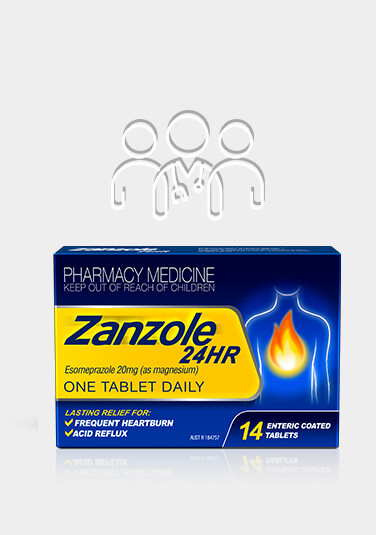Indigestion And Heartburn

Ever wondered what the difference between indigestion and heartburn is? Read on to find out more about indigestion, its causes and ways to help manage it at home. The terms ‘indigestion’ and ‘heartburn’ are sometimes used interchangeably, but really they are two different things — to make it more confusing they can occur together or on their own, and both usually after eating or drinking!
How Do I Know It’s Indigestion?
Indigestion (also known as dyspepsia) is a common problem that has a wide range of symptoms — the main one being pain or discomfort in the upper part of your tummy (abdomen). This is often, but not always, accompanied by the burning sensation of heartburn behind the breastbone.
Other common symptoms of indigestion can include:
- Feeling sick (nausea) or vomiting
- Bringing up food or fluids from your stomach (regurgitation)
- Feeling full, heavy or bloated
- Passing wind (flatulence), belching or burping.
Heartburn (also known as reflux) is also a common digestive problem and can also be a symptom of indigestion. The uncomfortable burning symptoms of heartburn are linked to escaping stomach acid making its way up your oesophagus (the tube that connects your throat and stomach). Sometimes, fluids or food can be regurgitated all the way back up to your mouth.
What Causes Indigestion?
Indigestion may be linked to what happens when stomach acid comes into contact with the sensitive
protective lining of the digestive system.
Stomach acid can start to break down the sensitive gut lining causing irritation and inflammation —
this can occur in different parts of your gut, for example, the bit that comes just after the stomach
(the duodenum) or the bit just before (the oesophagus). Sometimes the lining of your stomach can
become irritated too.
Indigestion is also thought to be caused in some people by an overly ‘sensitive’ gut lining reacting to
acidity or the stretching that occurs during eating.
There are also a few things to watch out for that may trigger indigestion or make them worse. These
can include:
- Taking certain medications — for example, some medications can relax the muscle at the top of your stomach allowing the acid to escape
- Being overweight — this is a common problem where extra weight can lead to extra pressure on your stomach
- Being stressed or anxious, or smoking
- Having another medical condition — hiatus hernias, Helicobacter pylori infections, gastrooesophageal reflux disease (GORD) and stomach ulcers are just some of the medical conditions that may have indigestion as one of their symptoms.
Managing Indigestion At Home
You may be able to relieve uncomfortable indigestion symptoms with a few lifestyle adjustments, such as:
- Cut down the pressure on your stomach by losing any excess weight
- Reduce your stress levels — by exercising regularly or trying out some relaxation techniques such as meditation
- Eat less foods or drinks you think may trigger your symptoms – such as spicy and fatty foods, tea, coffee or alcohol
- Stop smoking
- Don’t go to bed on a full stomach — try to eat 3 to 4 hours before you sleep as a full stomach can increase the risk of indigestion.
There are also over-the-counter medications you can take that provide immediate or long-term relief. Your pharmacist can help with which medication is appropriate for your symptoms.
Over-the-counter indigestion medicines include:
- Antacids — that help neutralise stomach acid
- Alginates — that form a protective foam barrier to help keep stomach acid away from your oesophagus
- Acid-suppressing medicines — that help reduce the amount of acid your stomach produces such as proton pump inhibitors (PPIs) and histamine H2 receptor blockers (H2 blockers)
When To See Your Doctor
If you can’t manage your indigestion with lifestyle changes or over-the-counter medications you should speak with your doctor. They can help determine any underlying causes or make changes to any of your medications that may be contributing to your digestion problems — but remember, don’t stop taking a prescribed medication unless your doctor tells you.
ALWAYS READ THE LABEL. FOLLOW THE DIRECTIONS FOR USE. IF SYMPTOMS PERSIST, WORSEN OR CHANGE UNEXPECTEDLY, TALK TO YOUR HEALTH PROFESSIONAL. THIS INFORMATION IS NOT INTENDED TO DIAGNOSE HEALTH PROBLEMS OR REPLACE THE ADVICE OF A HEALTHCARE PROFESSIONAL.




